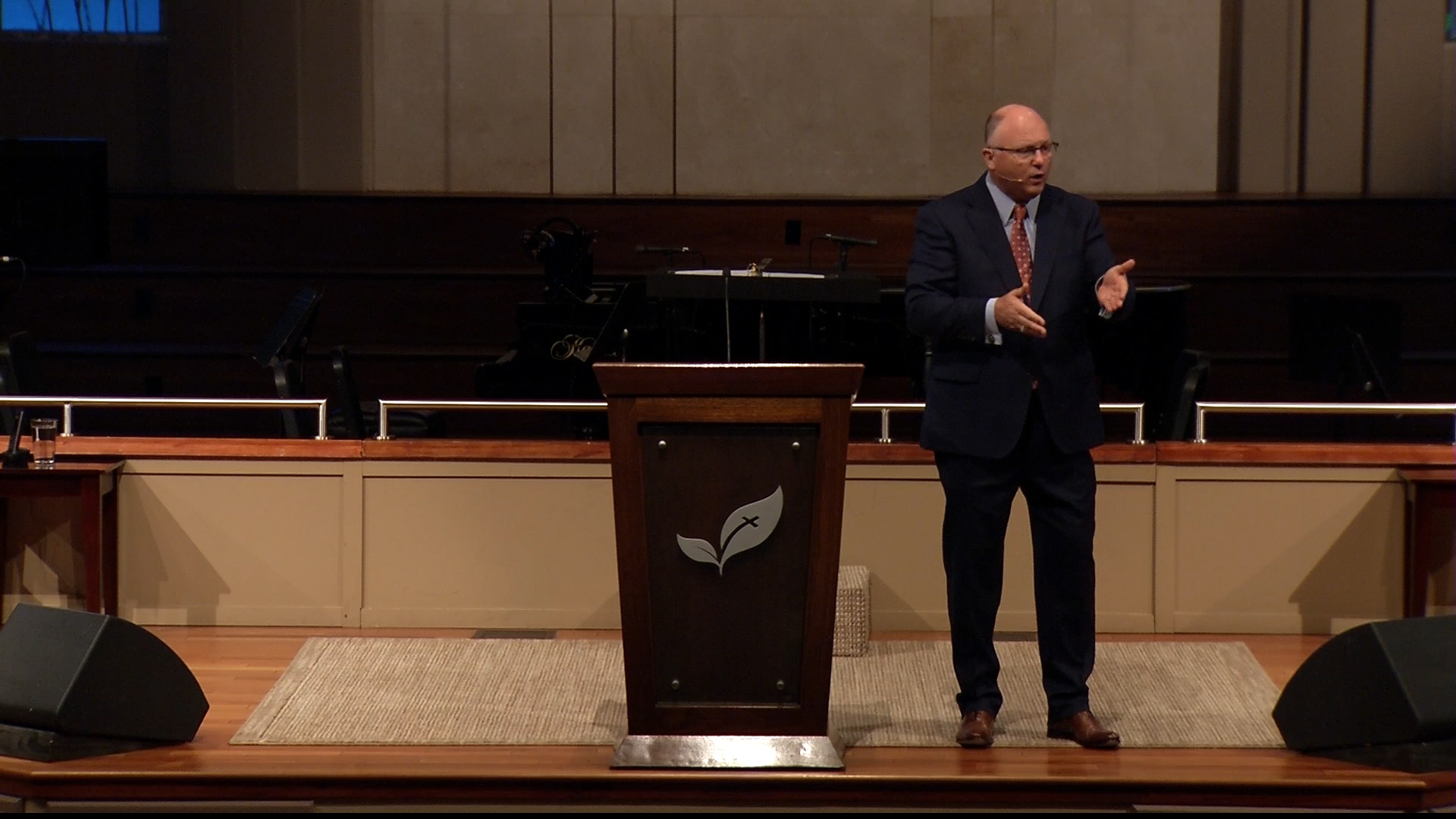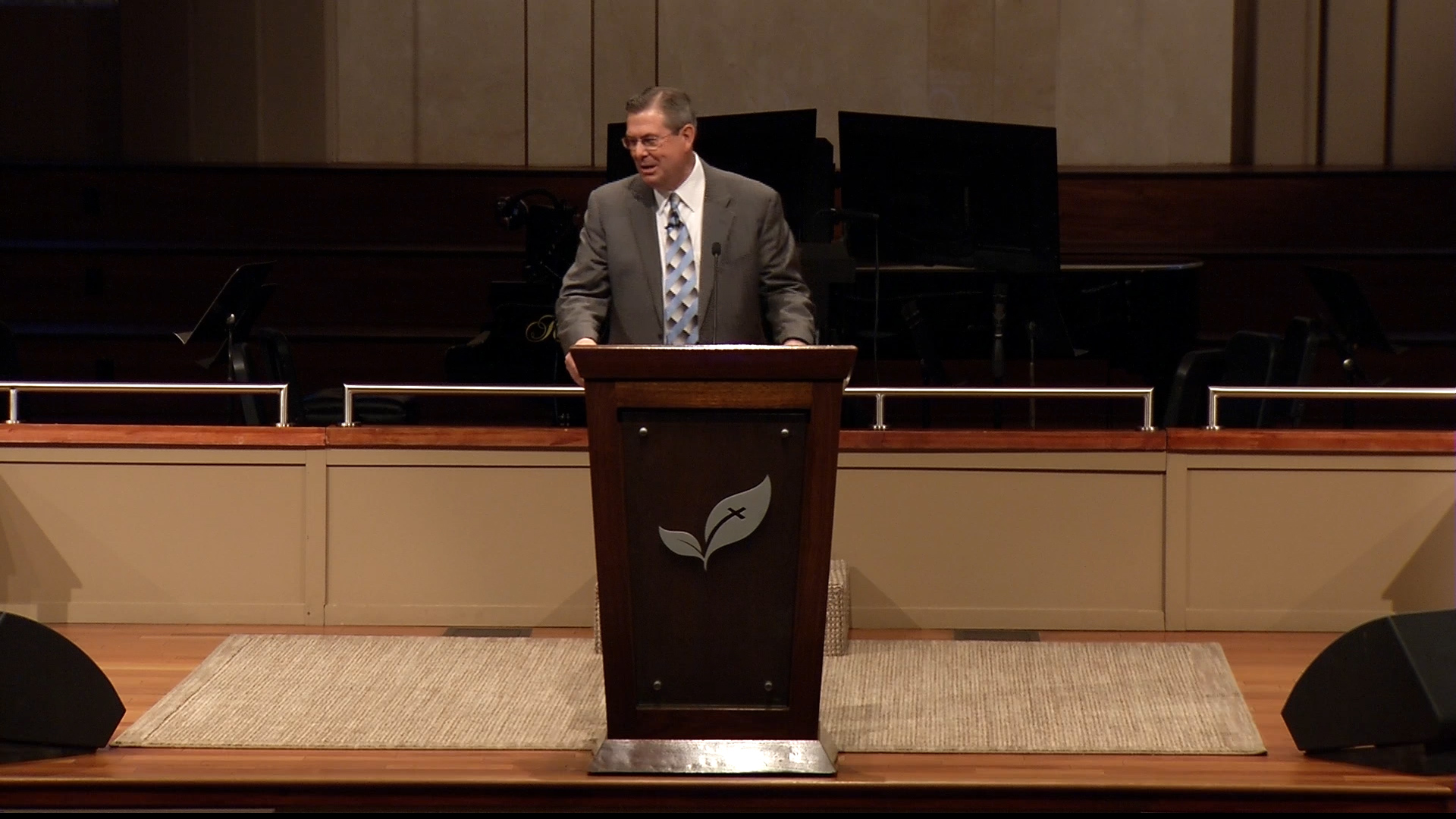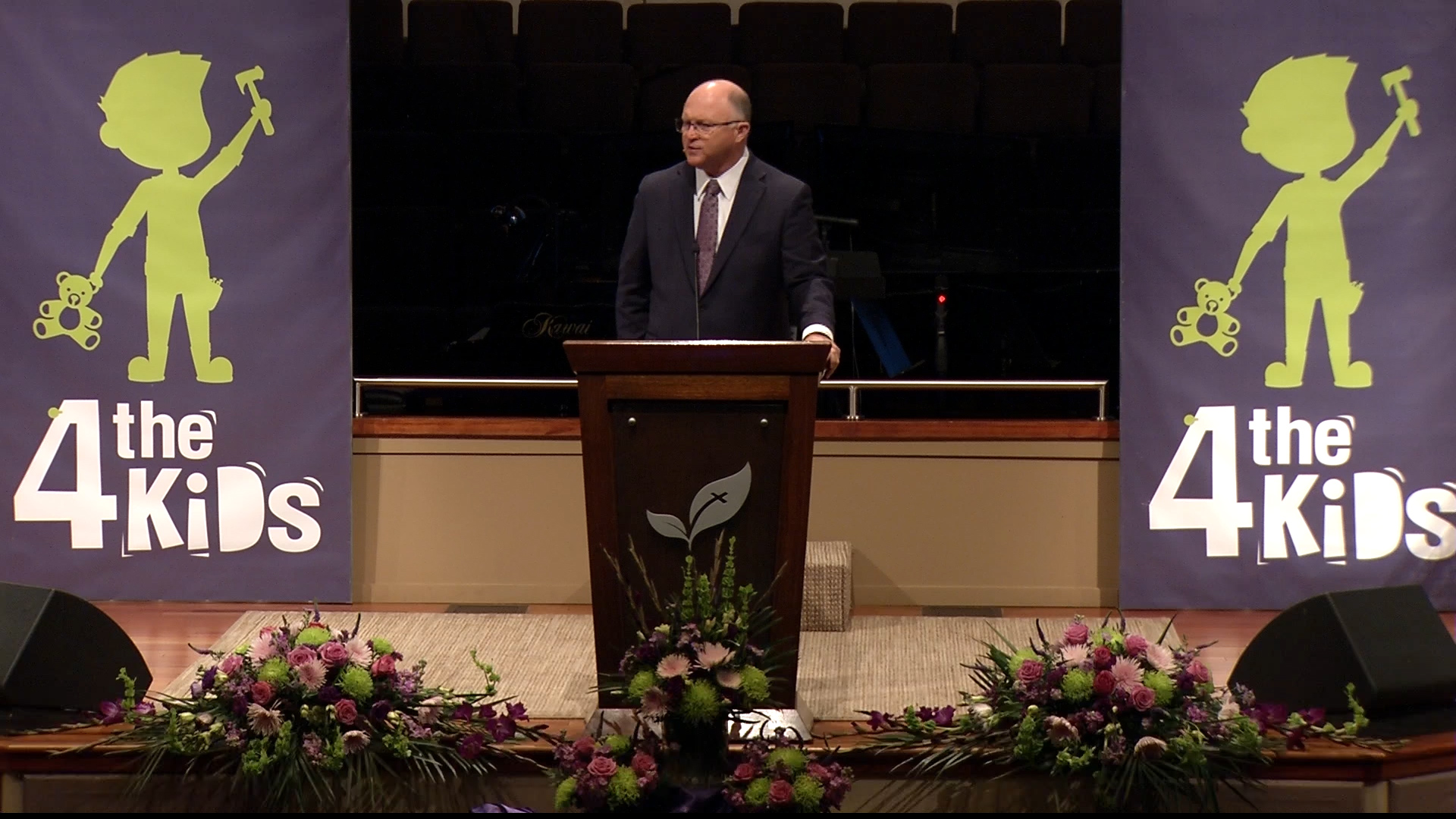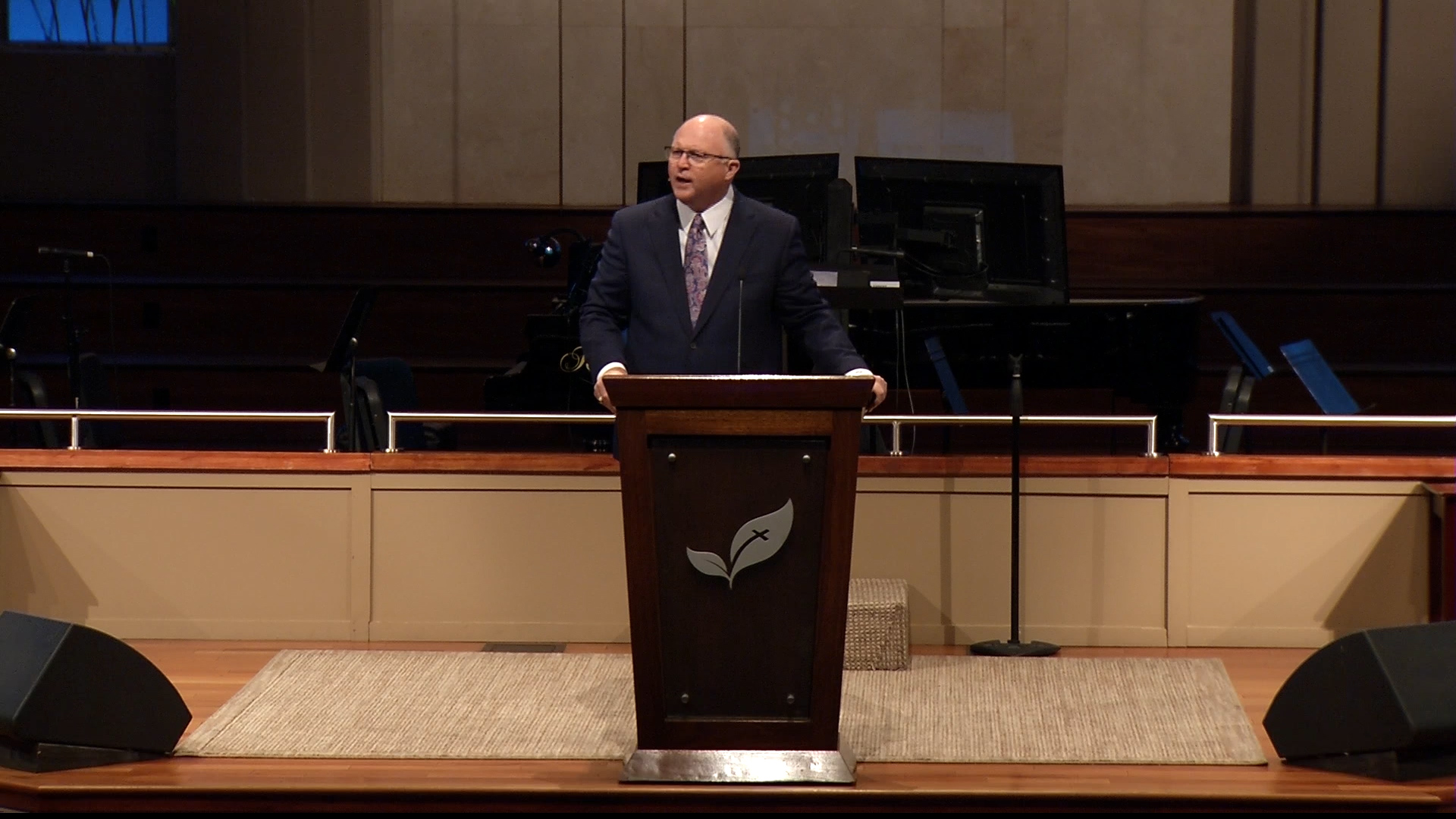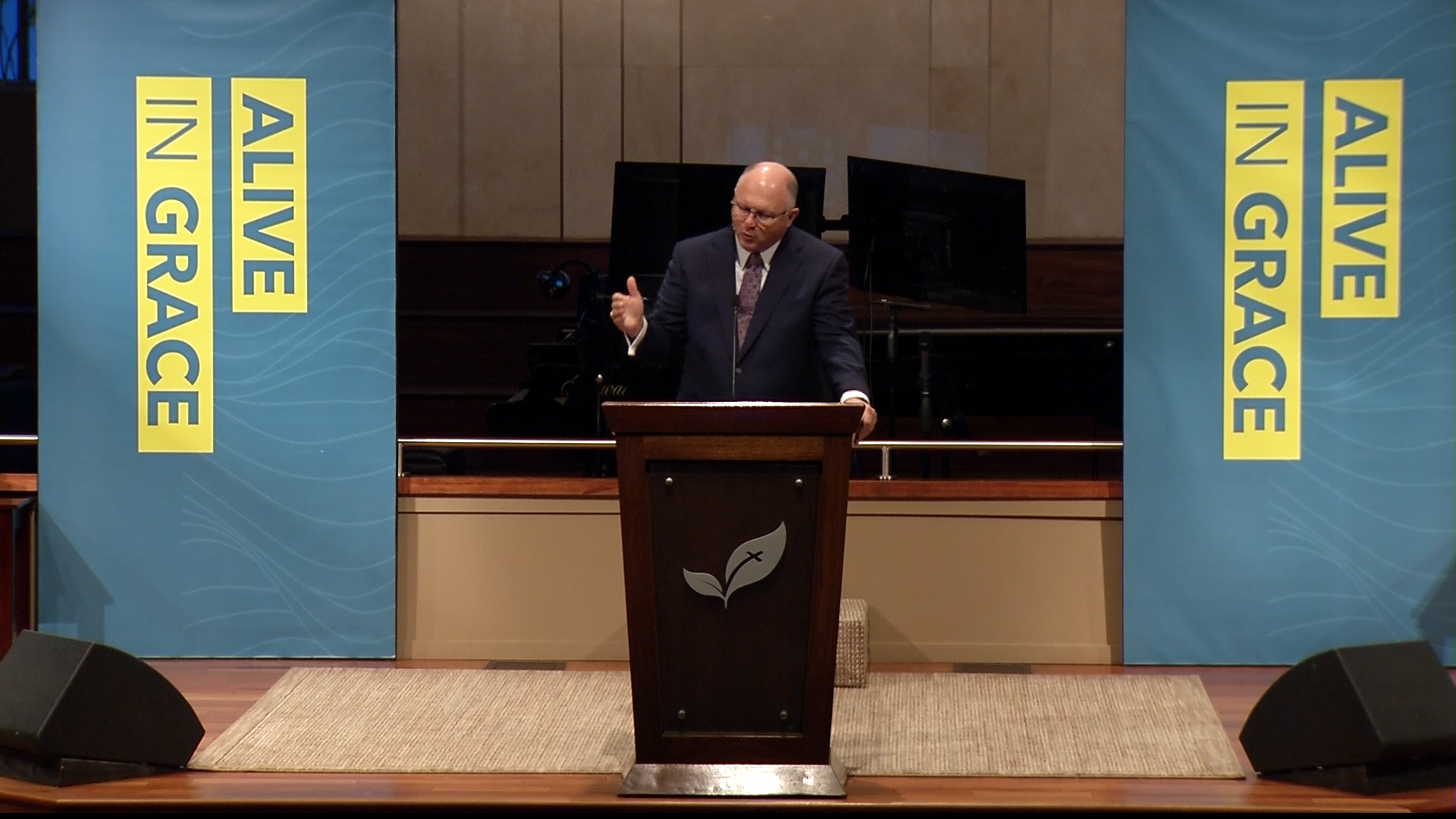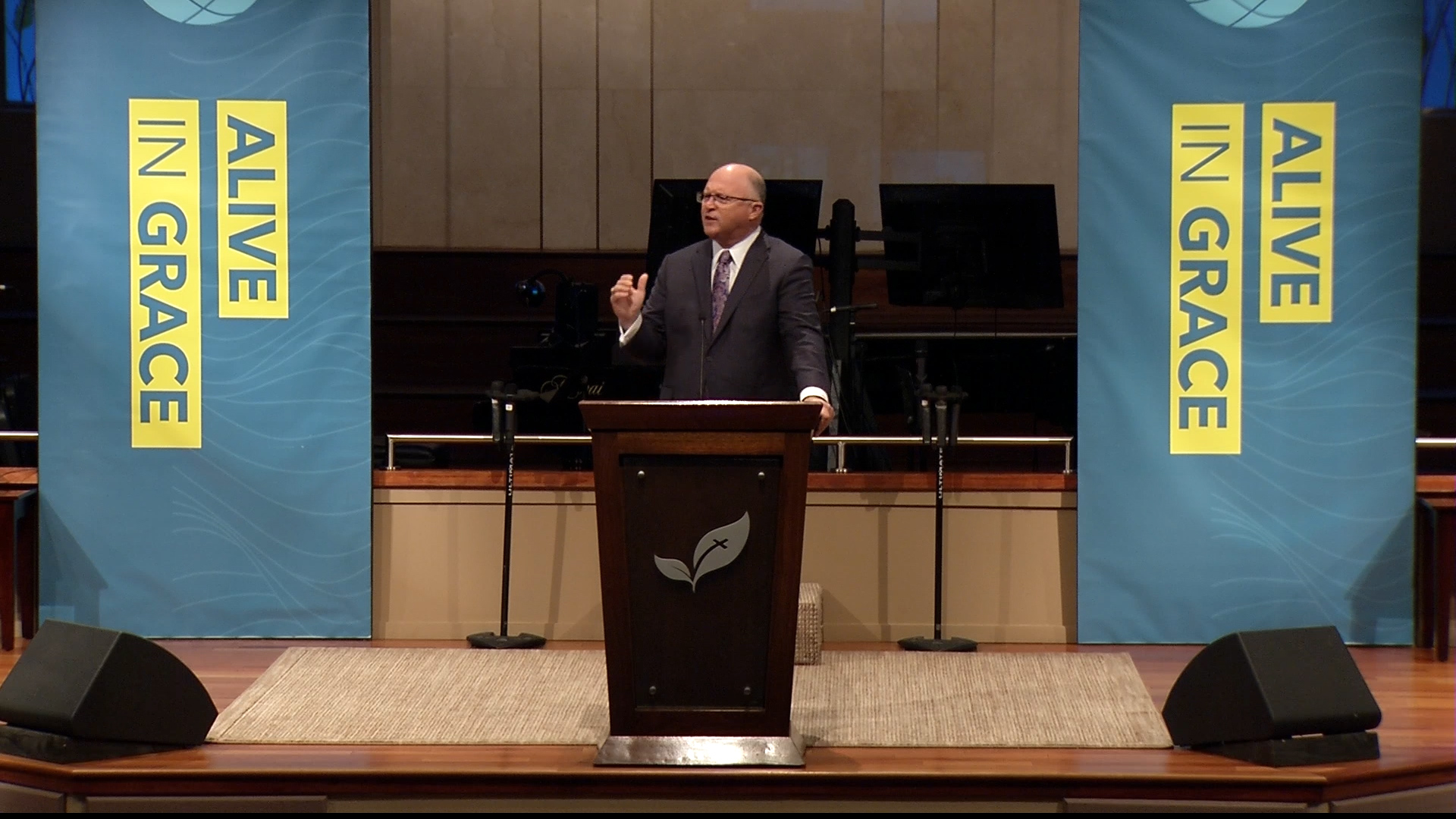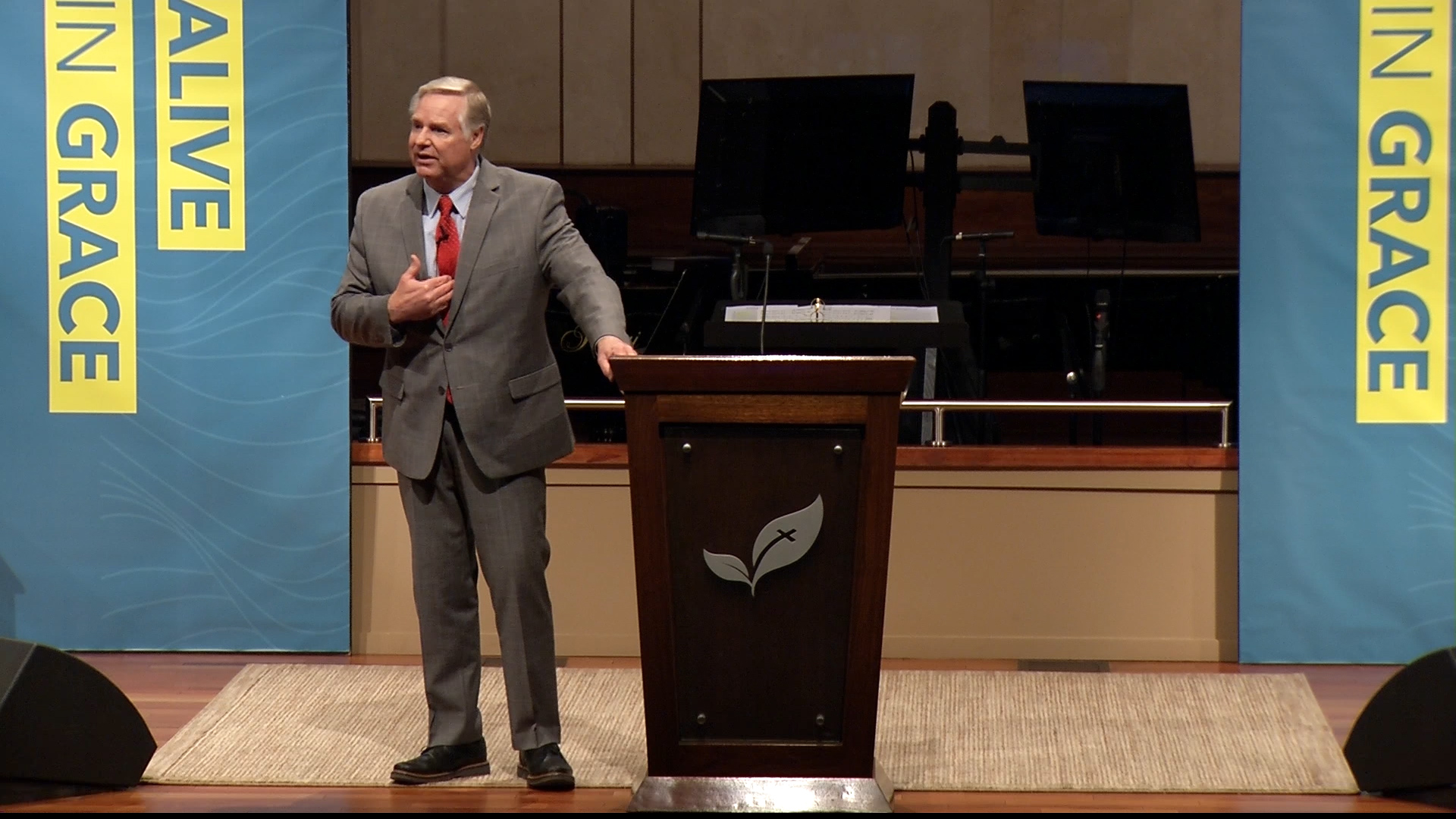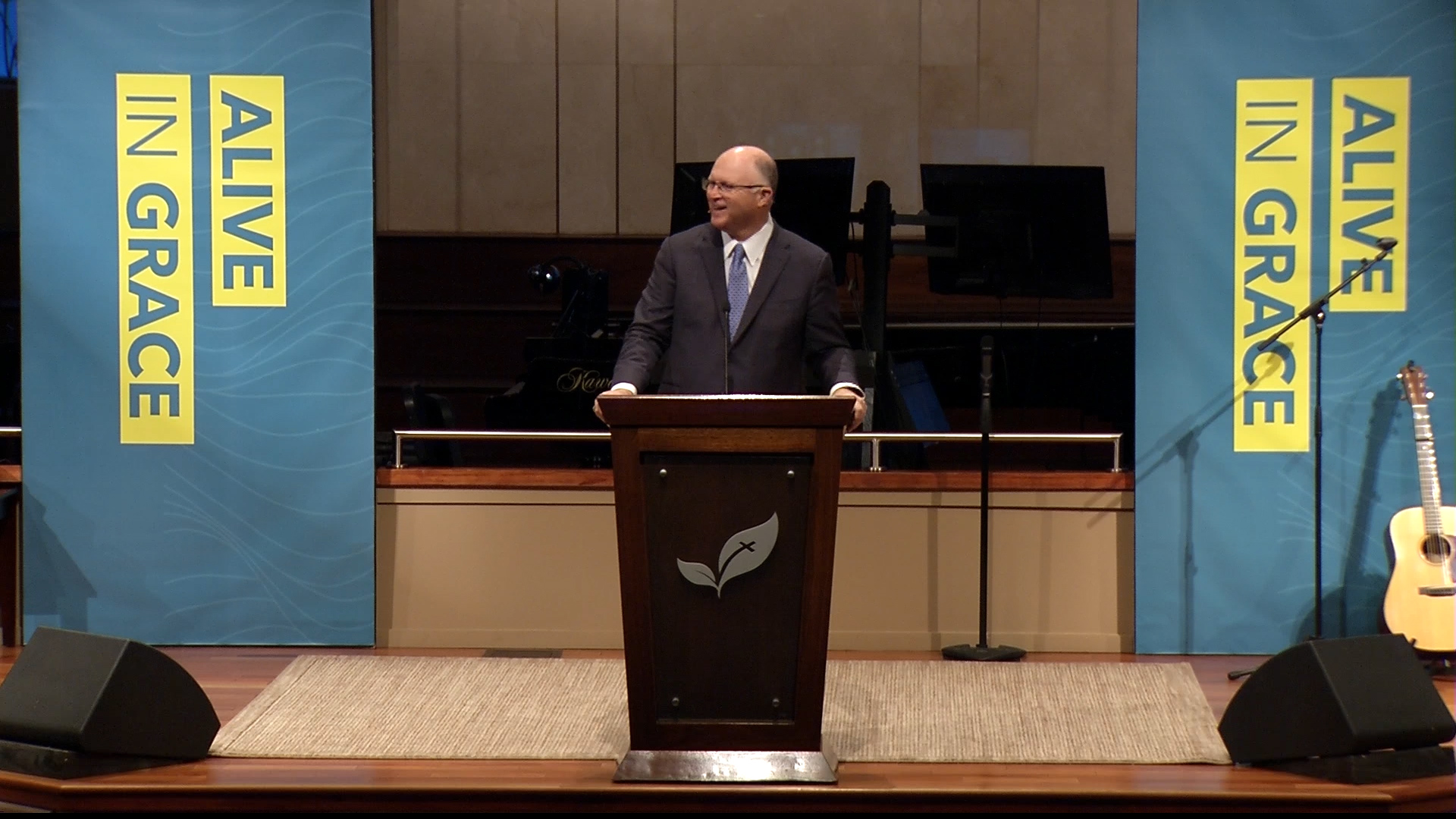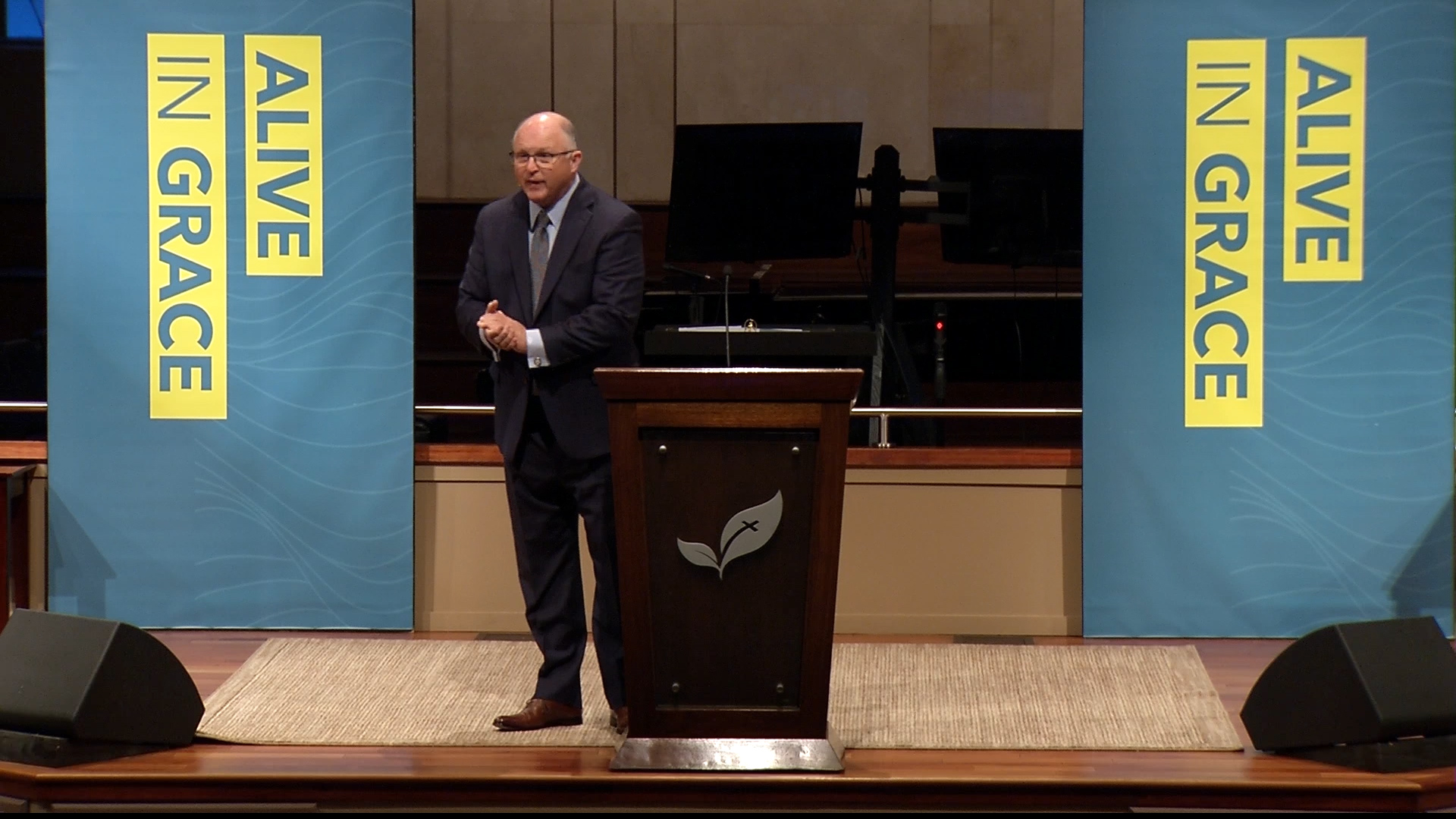Take your Bible, if you would please, and turn to the book of 1 Chronicles this morning, and 1 Chronicles chapter 28; and if you would please, let's stand for the reading of God's word, 1 Chronicles 28. If you're a guest with us you'll find the outline inside your bulletin, and I hope you follow along with us there if that'll help you. You'll also see many of the verses for today's message.
And I want to speak to you today about having a vision of grace. We've been learning about the grace of God at work in our hearts, and we're asking the Lord to expand our vision for the future generations. And I want you to learn with me from David, a man after God's own heart who just kept expanding his heart and vision, and I want you to see that in 1 Chronicles 28:1.
"And David assembled all the princes of Israel, the princes of the tribes, and the captains of the companies that ministered to the king by course, and the captains over the thousands, and captains over the hundreds, and the stewards over all the substance and possession of the king, and of his sons, with the officers, and with the mighty men, and with all the valiant men, unto Jerusalem. Then David the king stood up upon his feet, and said, 'Hear me, my brethren, and my people: As for me, I had in mine heart to build an house of rest for the ark of the covenant of the Lord, and for the footstool of our God, and had made ready for the building: but God said unto me, "Thou shalt not build an house for my name, because thou hast been a man of war, and hast shed blood." Howbeit the Lord God of Israel chose me before all the house of my father to be king over Israel for ever: for he hath chosen Judah to be the ruler; and of the house of Judah, the house of my father; and among the sons of my father he liked me to make me king over all Israel: and of all my sons, (for the Lord hath given me many sons,) he hath chosen Solomon my son to sit upon the throne of the kingdom of the Lord over Israel. And he said unto me, "Solomon thy son, he shall build my house and my courts: for I have chosen him to be my son, and I will be his father."'" Notice, if you would, in verse 10 the Bible says, "Take heed now; for the Lord hath chosen thee to build an house for the sanctuary: be strong, and do it." Let us pray.
Father, we thank you for the testimony of David. And, Lord, we pray that you would help us to be a church growing in grace and growing in vision. Give us that keen sight for the future, for the future generations who need to hear the gospel and who will carry the gospel. And we pray that you would bless the time as we hear this song and then the time in your word this morning, and I ask this in Jesus' name. Amen. You may be seated.
Well, this morning we're going to learn that we must have the moving of God in our lives today in order to have a vision for tomorrow. In fact, I believe it is the duty of spiritual Christians to be thinking wisely regarding the transference of our faith and the use of our material blessings for the next generation. I believe God has called all of us to think not only of today, but how can we make a difference tomorrow? In fact, notice in your notes this morning Psalm 78:6, because I want you to see the Bible teaches us to be concerned for generations to come.
The Bible says, "that the generation to come might know them," speaking of God's teachings, "even the children which should be born; who should arise and declare them to their children: that they might set their hope in God, and not forget the works of God, but keep his commandments." The psalmist David said that it is God's will that we teach the children in such a way that they might indeed teach their children the truth of God. And so, we must not live merely for the now and for ourselves, but for the generations to come.
And so, we see this morning David was such a man, living with the future in mind. David began his reign about 1000 BC. He reigned for forty years, until the time when Solomon took the position as the king of Israel. But around the year 961 BC David stood before the leaders of the entire kingdom. And a moment ago we read the record of King David standing before all of these leaders. He was a man after God's own heart. He was a man with a burden not only for his day or Solomon's day, but for those that would come after Solomon and for many hundreds and thousands of years after.
David was a man like us. His outward man was perishing, but his inward man was being renewed. His outward man was perishing. How many of you can relate to that? Anybody going to give me a witness on that? You get up in the morning and it sounds like Rice Krispies – snap, crackle, pop – you know what I'm talking about? The outward man is perishing.
But don't you love to be around someone that though the outward man is perishing, the inward man is being renewed, and they are as alive in Christ as they ever were, excited for what God is going to do. And David has a great desire in 2 Samuel 7:2. It says, "The king said unto Nathan the prophet, 'See now, I dwell in an house of cedar, but the ark of God dwelleth within curtains.'" He was burdened that the ark of God would have a resting place and that the temple would be constructed.
Now many times simply out of greed we can have a vision for today and for this life. But grace produces a vision for those in the life to come. Grace causes us to think not only about ourselves today, but about those to follow us tomorrow. And that's why Paul told the Corinthians believers in 2 Corinthians 8:7, "See that ye grown in this grace also." He said, "I want you to be growing not only in your teaching and your learning, but in the grace of God as well."
Well, as we look into the life of David this morning I want you to see how God had worked in his heart to expand his vision, and I want you to do what I've been doing and pray with me and say, "Lord, expand my vision for the future generations in Lancaster and the Antelope Valley who need the gospel."
I want you to notice, first of all, David had a passionate vision. The Bible tells us about this vision in verse 1. It says, "David assembled all the princes of Israel, the princes of the tribes, and the captains of the companies." He gathered them together.
You know, the Bible says in Proverbs 29:18, "Where there is no vision, the people perish: but he that keepeth the law, happy is he." Now the word "vision" there speaks of a biblical understanding. And so the Bible says where there's no biblical understanding, the people perish.
Do you know why people are perishing today in Hollywood? Because there's no biblical understanding. Do you know why people are perishing today in the Antelope Valley? For lack of biblical understanding. Where there is no biblical understanding, where there is no vision, the people perish. And so, David is gathering the people together to give them God's vision. How many of you know that's why we come to church, to get God's mind on the matter, to get the vision of God for our lives?
And so, we see that David with this passionate vision, first of all, shares his vision. This was a shared vision. And the Bible tells us that he has this final address, and the subject of his final address is the temple of God. His last time of speaking to the people is about a building called the temple, and he calls all the leaders together. You'll see there in verses 1 and 2, he calls the priests, and he calls the captains, and he calls the stewards of the substance in chapter 27, verses 25 through 31. And he calls in chapter 27 David's counselors. And then finally we read in chapter 28:11 he calls the mighty men or the valiant men. And you can do the math sometime, but somewhere between thirty-five and thirty-seven hundred leaders have gathered around the king, and he says, "I want to share a vision with you. I want to tell you what I believe God would have us to do next." And these leaders were there to hear and receive the vision.
I want to say this morning I thank the Lord that for 34 years as we have shared biblical truth and as we have shared the vision that God has placed upon our heart, that we have had godly men and women in this church who have heard and who have shared the vision also; and what a blessing indeed to pastor such a wonderful church family. But here we see David sharing the vision.
And I want you to see not only was it a shared vision, it was a purposeful vision. You see, this man had a purpose in his heart, and I want you to see it in verse 2. The Bible says, "Then David the king stood upon his feet, and said, 'Here me, my brethren, and my people: As for me, I had in my heart to build an house of rest for the ark of the covenant of the Lord."
Here was a man with a purpose in his heart. He said, "I've had this in my heart. It's been my passion. It's been my desire." In fact, in verse 2, at the last portion he says, "and had made ready for the building." I mean, he had a purpose in his mind. He had been making ready for the building of the temple.
And this is similar to what we see in the book of 2 Corinthians 8:6 when Paul says to the Corinthians, "I sent Titus, that he would remind you to make ready your offering for the saints Jerusalem, that you would finish this grace also." And David said, "I've been making ready. I've been preparing for the temple. I want you to know that this is a passion of my heart."
I've tried to share vision over the years and just kind of share what I believe God would have us to do. I want you to see something that I shared way back 32 years ago with our church family. Let's take a look.
[Video playing, 0:11:00 to 0:11:42]
You're saying, "Who's the skinny guy with all that hair?" I know that's what some of you are saying. But, you know, as we stood there as a 26-year-old pastor just trying to say, "Here's some things God could do. Here's some things we're praying God could do." How many of you are thankful we serve a faithful God today?
By the way, one of the things I mentioned way back then was the Bus Barn. We're calling it the Eldon Lofgren Transportation Facility. And we've been slowed down with all the rain; we're thankful for the rain. But finally this week they poured the foundation and the slab, and that vision is going to become a reality, Lord willing, early in the summer, a place to work on these busses, and we're excited about that.
I just want you to know that the passion in my heart the Lord has kindled and rekindled, and kindled and rekindled, and I'm as excited about the Kid City Building as anything we've ever done. And I firmly believe it to be the greatest need in our church at this present moment. I have a passionate vision to reach children while we can.
But notice not only David's passionate vision, notice secondly, it was a planned vision, it was a planned vision. You see, a dream without a plan is only a wish. And there are many people that have dreams, but they don't have a plan. And David shares with us his plan, and essentially his plan was to do as much as he could before he died.
I want you to see the little quote in our notes there by Edmund Burke, it's so very important for all of us today. It says, "Nobody made a greater mistake than he who did nothing because he could do only a little." And I want to challenge everyone today, whether it's our weekly ties or the special offering on March 17th, that we do what we can do by the grace of God.
And notice the plan of David. I want you to see, first of all, his opportunity was limited, his opportunity was limited. Did you see that in verse 3? "But God said unto me, 'Thou shalt not build an house for my name, because thou has been a man of war, and hast shed blood.'"
Now we see from this that David would not actually construct the temple. It would not be his privilege to raise up the temple because God said, "You've been a bloody man, a man of war; I'm not going to have you build the temple." Someone might say, "Well, I don't understand that." But God's ways are not our ways. This was the message of God to David.
So while he could not build the temple, he would do what he could, and that was to prepare for the building of the temple. So notice that the Bible speaks of this. It says in verse 4 that God chose him to be the king of Israel. And so he recognized that as the king he would not build, but he could prepare, he could prepare for the future.
I read some time ago about Walt Disney and how he had come out to Orange County, and down there in Anaheim saw all the various different orange groves, and he saw in his mind Disney Land. And after many years he constructed Disney Land and it was a great success. And then he wanted to find a place on the East Coast where he could continue his work. And after ten years of searching he found a great property in Orlando, and he began to draw the drawings and he began to imagine Space Mountain and It's a Small World and all of those rides out on the East Coast, and construction was underway.
But in 1996, five years before Walt Disney World was completed, Walt Disney passed away. Nevertheless, five years later, the park was opened, and now over 20 million people a year visit Disney World in Orlando, Florida. And I want you to think with me today about a man who really never saw the fruit of his labor, but in his mind he saw children riding Space Mountain and It's a Small World.
And I want to ask you, "How many of you in your mind can see children across the way hearing about Jesus Christ and accepting Jesus Christ as their Savior?" You see, that's the vision we have, a vision where young people can know right from wrong, where they can know that they are fearfully and wonderfully made, where they can be taught that God created male and female, where they can be taught that though we are all sinners, Jesus Christ came and shed his blood for our sin, where they can be taught the purpose of life; that's the vision. And while our opportunity may be limited and while some of us may never see all the children that are saved in that building, we must have the vision today for the need of tomorrow. His opportunity was limited.
I want you to notice, secondly, his plan was generational, his plan was multigenerational in scope. Now notice what we learn in verse 9 of our text: "And thou, Solomon my son, know thou the God of thy father, and serve him with a perfect heart and a willing mind: for the Lord searcheth all hearts, and understandeth all imagination of thoughts: if thou seek him, he will be found of thee; but if thou forsake him, he will cast thee off for ever. Take heed now; for the Lord hath chosen thee to build the house for the sanctuary: be strong, and do it."
So here we see that Solomon would be the builder. And imagine if you were the king's son in front of thirty-seven hundred powerful and influential people, and your father's saying, "Be strong, and do it." He's laying it right down at his feet as a responsibility from God.
And what amazes me is that the very stones upon which Herod rebuilt the temple in the first century were the stones that Solomon had laid nearly a thousand years before. And when you visit Jerusalem and when you go down into the tour underneath the ancient walls you'll find and you'll hear them say, "These are the walls, the course that Solomon laid," all because of the challenge that was given by his father David.
So Solomon was the builder and David was the designer. And I want you to see the design there in verse 11 the Bible says, "Then David gave to Solomon his son the pattern of the porch, and of the houses thereof, and of the treasuries thereof, and of the upper chambers thereof, and of the inner parlours thereof, and of the place of the mercy seat, and the pattern of all that he had by the spirit, of the courts of the house of the Lord, and of all the chambers round about, of the treasures of the house of God, and of the treasures of the dedicated things: also for the courses of the priests and the Levites, and for all the work of the service of the house of the Lord, and for all the vessels of the service in the house of the Lord."
In other words, David is saying, "Solomon, here's the blueprints. I want you to know the plan is already prepared. This is more than just something in my mind, this is something that has been given and has been prepared: plans for the porch, plans for the houses for the treasury, the upper chambers, the inner parlour, the Holy of Holies." And as David gave this design, he knew that it would touch generations to come. He knew that it would be the place, the resting place of the ark of the covenant, where the high priests would go in on the Day of Atonement, and where he would sprinkle the blood on the mercy seat, and where he would pray the prayers of atonement for the entire nation. He knew that this building would be symbolic, but it would also be the reverential place of worship and atonement for the children of Israel. Here was a man, David, designing something that would last far beyond his lifetime.
I want to ask you this morning, "What are you doing today that will last far beyond your lifetime? What are you involved in today that will touch tomorrow and that will touch eternity?" Isn't that a big reason why we come to church, so that we can be a part of something bigger than ourselves, something that is eternal, something that is more than just for today?
Do you realize when you have family altar and when you train your children that you are touching tomorrow? Do you realize that when you read the Word of God to your children or grandchildren that you are touching tomorrow? Are you helping to train the next generation? Have you taken time to consider your resources, and have you planned appropriately? Have you done like Terrie and I and many other couples in the church to establish a will or a family trust that includes the work of God even after your passing? Have you thought about all that God has given you both in wisdom and in material blessings, and how you could lay it up in store for the things of the future and the people of the future?
You see, that's what this Kid City Building is all about. The plans have been drawn, they're nearly completed. Soon they'll go to the city for various different review and plans check. And all of this is being prepared not simply to erect a building, but to touch lives for all of eternity. And I'm excited about what God is going to do because I've studied many times the fact that is in your notes: two out of three Christians accept Jesus Christ as their Savior before the age of 18. I want to say that again. Two out of three Christians accept Jesus Christ as their Savior before the age of 18.
I think it is not too far of a stretch. In fact, I believe it to be absolutely true, that there will likely be more people saved in the Kid City Building on a given Sunday than in this auditorium on a given Sunday. And I'm hoping that's not true; I hope we see the altars flooded with people being saved every Sunday in this auditorium. But just statistically speaking, most people get saved when they're young; and that's why we can touch eternity in a very significant way as we participate and support this project.
Missionary Mary Slessor to Africa was saved at age 6. Jim Elliot, the great missionary to South American Indians was saved at age 6. John R. Rice was saved at age 9. Curtis Hutson was saved at age 11. Lester Roloff was saved at age 12. Charles Spurgeon and C. T. Studd and William Carey were saved at age 12. George Whitefield, Hudson Taylor, and David Livingstone were saved at age 13. H. A. Ironside, Lee Roberson, and Tom Malone at age 14 – the list goes on. But most people are saved at a very early age.
This is why I believe David had a passionate vision and a planned vision. He wanted the faith to go forward into every next generation. But not only did he have a passionate vision, not only did he give the plans to Solomon, but I want you to notice finally this morning, it was a prioritized vision, it was a prioritized vision.
Now so many times today we see people that make a plan, but they do not prioritize, they do not put God in the middle of that plan. And I want you to see what David does. I want you to notice, first of all, the priority he places on God's power. Jesus said, "Without me, you can do nothing." And this is essentially what David is going to say in verse 20 of 1 Chronicles 28.
Notice if you would, "And David said to Solomon his son, 'Be strong and of a good courage, and do it: fear not, nor be dismayed: for the Lord God, even my God, will be with thee.'" By the way, fathers, that what your sons and daughters need to hear from you. "You trust the Lord in your giving. You trust the Lord in your career. You trust the Lord in your marriage. God, even my God, the one that has blessed me, he's going to bless you."
Notice what David says: "He will not fail thee, nor forsake thee, until thou hast finished all the work for the service of the house of the Lord." You see, the critical component to his plan was that God was with them and that God would provide for them. And, oh, that we would never forget this principle.
How many times in my life have I needed a nudging of God like Solomon was receiving here. And David was saying, "Be of good courage, fear not; God will do it." And sometimes the Lord has come to me and said, "Be of good courage," and he has taken the fire and stoked the fire in my heart.
And many of you today may need God to come to you and say, "Be of good courage, be not afraid; God is able." Whether that is in your tithing on a weekly basis or the giving for this offering or some trial that you're experiencing today: God is able, and he will provide.
Notice in Hebrews 13:5, "Let your conversation be without covetousness; and be content with such things as ye have: for he hath said, 'I will never leave thee, nor forsake thee.' So that we may boldly say, 'The Lord is my helper, I will not fear what man shall do unto me.'"
Friend, can I encourage you today: don't be filled with fear, be filled with faith. How many of you have noticed that those two can cancel each other out? Some people get so much fear it cancels out faith. But God says, "I want you to be filled with faith so that it will cancel out your fear." And God says, "I will provide."
And we see that David is reminding the leaders of the priority of the power of God. He doesn't say to them, "Do this because I'm great. Do this because of what the kingdom has." He says, "Always remember to put your priority on the power of God." Verse 20 is a critical part of his plan, "that is that the Lord your God, he will be with thee."
Friend, I don't know what you're planning on or what you're praying for, but if God be your partner, make your plans large, and keep your trust in the Lord Jesus Christ, that he will supply and he will bless and he will meet your every need. And, oh, how we thank the Lord for that truth.
So we see the priority of God's power. But notice, secondly, the priority of the people's preparation. Now the first and foremost need in any project is the power of God. Secondly then is that we would participate, that we would be involved ourselves. And so let's see how this works in verse 2 of chapter 29.
Chapter 29 and verse 2, David says, "Now I have prepared," here's his plan, "I have prepared with all my might for the house of my God the gold for things to be made of gold, and the silver for things of silver, and the brass for things of brass, the iron for things of iron, and the wood for things of wood; onyx stones, and stones to be set, glistering stones, and divers colours, and all manner of precious stones, and marble in abundance. Moreover, because I have set my affection to the house of my God, I have of mine own proper good, of gold and silver, which I have given to the house of my God, over and above all that I have prepared for the holy house."
Now just listen to what David is saying. Here is a man who not only had seen the blueprint, but he had seen the need for wood and gold and silver and the precious stones that would no doubt be involved in the construction of this temple. And I think a key phrase is found in verse 2, I want you to see it: "Now I have prepared with all my might for the house of my God." Notice that: "with all of his might." This was not a tip that he was throwing God, this was not leftovers; but with all of his might he was preparing.
And I want to encourage you, friend, when it comes to the work of God, don't be half-hearted. Don't let it be an afterthought. Don't show up on March 17th going, "Oh, yeah, today's the day we're supposed to give an offering for the Children's Building." But with all of our might we should be praying and preparing for the house of our God.
Well, why would we do that? Well, notice in verse 3 what he said: "Moreover," notice this, "because I have set my affection to the house of my God." Let's say that phrase together: "Because I have set my affection to the house of my God." One more time: "Because I set my affection to the house of my God."
You see, his heart was invested in this, he had set his affection to it. And the Bible says, "For where your treasure is, there will your," what, "heart be also." And so there is no doubt that David's heart was in the house of God. His heart was for the work of God. His heart was for the things of God. Where your treasure is, that's where your heart will be. And David said, "Of my own affection have I become involved in this, because my heart is for the house of God. It is for the mercy seat which is representative of the presence of God in this place and with his people."
Now we've all seen that people have their hearts in many places, and you can tell by the way that they invest and by what they worship. This past year just a few months ago there was an auction in 2018, the end of 2018, over in Japan for a large blue tuna. It's an actual auction that takes place every year. And this particular tuna that was auctioned was a 612-pound bluefin tuna.
Now just curious, how many of you eat sushi? Let me see where you are. All right, we'll have some Pepto-Bismol right after church today. If you're like me, I don't mind eating it, I just want to know, "How long has it been since it came out of water?" right? I want to know that it's fresh, I don't want to just eat any ol' kind of sushi; and apparently neither did the man who bought this tuna at the auction. He is known as the self-described tuna king, Kiyoshi Kimura is his name.
Kiyoshi Kimura shows up at the auction for the tuna, it's an annual even in Japan; and by the time everything was said and done, he paid $3.1 million for 600 pounds of tuna. Now how many of you would agree with me the man must love tuna, because where your treasure is, that's where – what? – your heart is also.
And we could go on and on with stories of how people spend their money and how that it links to their affection. And no doubt, this man loves tuna. But what I'm simply saying is that we must set apart and we must prepare to show our affection to God and lay up for ourselves treasures in heaven where neither moth nor rust doth grow, and where thieves do not break through or steal. And here we see David's preparation.
But not only do we see the preparation of David, I want you to see the participation of all the people, and I want you to notice this in verse 6; this amazes me: "Then the chief of the fathers and princes of the tribes of Israel and the captains of the thousands and of the hundred, with the rulers of the king's work." What do they do? The Bible says, "They offered willingly." Let's say that together: "They offered willingly."
Now imagine David the king, he's getting out in front of all the people. He's about to die, Solomon's going to take over; he's pouring his heart out. He's saying, "Look, I can't built it, I wish I could. But my heart is so in it, I've already laid out all the blueprints, all of the gold and silver that I could muster. Everything that I could do for the generations to come, this is what I have done." And he says, "Solomon and all of you leaders, I want to challenge you to raise up this building for the glory of God."
But what would they say? Would this be something that they would participate in, or would they say, "Look at David. We're really glad that you feel so about this building and everything. But you know, we just had other plans. There's other things we've got our priority list."
What did they do? The Bible tells us they offered willingly. In fact, notice in verse 7, "and gave for the service of the house of God of gold five thousand talents and ten thousand drams, and of silver ten thousand talents, and of brass eighteen thousand talents, and one hundred thousand talents of iron. And they with whom the precious stones were found and gave them to the treasure of the house of the Lord, by the hand of Jehiel the Gershonite." Verse 9, "Then the people rejoiced, for that they offered willingly, because with perfect heart they offered willingly to the Lord: and David the king also rejoiced with great joy."
Now I heard a pastor years ago say, "God loves a cheerful giver, but he'll take it from a grump." I don't know that I really agree with that. I really honestly believe that as much as God looks at an amount – and I'm sure he does – that he looks at the heart, doesn't he? He looks at the heart of a giver.
And when we look at the heart the children of Israel, the Bible specifically says things like, "They offered willingly, and they offered with great joy." And, oh, what a joyous time this was for them. And I have found that when we're motivated by grace and when have a vision of grace and when we're preparing by grace, and when God is at work in our hearts, and when we participate in something like this, that it's a joyful experience. It's a wonderful privilege to be a part of the work of God, touching the next generation for the glory of God. And what does it say when we participate? Well, we know what it said for David. It said that David's heart was for God, it was for the next generation.
What does it say about us when we give in the offering? What is it saying about us when we think about and participate in a project like Kid City? Well, there's several things I put in your bulletin. I believe it says, first of all, we have faith in God. It's just a simple statement, but we're trusting in the Lord with all of our heart. We're saying, "God, you provided once, you'll provide again. God, I had some other things I could have done with this, but I'm going to put it here because I believe you placed it on my heart. And, Lord, I'm going to trust you to provide, because your word says, 'Give and it shall be given unto me.' So, Lord, I'm trusting you."
Secondly, I believe it says that we have compassion for the lost. It says that we really do believe children are the greatest resource for the future. It does really say that we believe that they need Christ as their Savior. Thirdly, it says we have hope for the next generation. Fourthly, we care about families and children. And, fifthly, it says that we as a pastor and a people are committed to the multigenerational vision of this church. It says that we are here not for a day, not for a season, but that we are staking our claim, and that we're going to see this through to the glory of God. And what a privilege it is to be a part of the perpetual working of God in developing and advancing his kingdom.
John Bunyan, the great Baptist preacher of Bedford, England who was imprisoned many years for his faith, said, "A man there was, they called him mad; the more he gave, the more he had." Isn't that a great poem? Let's say that together: "A man there was, they called him mad; the more he gave, the more he had."
God will take care of you. You ever heard that song? "Be not dismayed whate'er betide, God will take care of you! Beneath his wings of love abide, God will take care of you!" And this is what we're doing as we give, we're saying, "Lord, I'm trusting you to take care."
And so, David said, "I'm preparing." And the people said, "Well, we want to be a part of this," willingly. And then notice what happens in verse 9 again. It says, "The people rejoiced, for that they had offered willingly, because with perfect heart they offered willingly to the Lord." They wanted to give. The Lord loveth a cheerful giver.
And as we prepare and plan – and many of us for many months have been setting things aside and asking God to help us for March 17th – I want you to know that as we do that with a willing heart, God can get in the middle of it and bless it abundantly for his honor and glory. What we need to pray for today is a passionate vision: "Lord, give me a passion for the next generation." We need to pray for a planned vision: "Lord, help me to begin preparing now. Even as David was preparing and setting aside and getting the drawings ready, Lord, help me to plan. And then, Lord, help me to keep the priority right. Help me to keep the priority on you; and I'm trusting you for tomorrow."
You see, this is for the kids, it's for the future; but really, it's for eternity, because the Bible says, "It is appointed unto man once to die, and after this," what, "the judgment." Every one of us, every one of us, the Bible says, life is but a vapor. It's here for just a little while, and then it's gone.
I want to share one final verse with you and then we'll be done. I want you to turn to 2 Timothy 3:15. Tonight we have a very special service over in the Walther Center, and we're going to interview some educators from our community and just get educated as a church about the needs of children. But I'm going to tell you right now, the greatest need of every child from 2 Timothy 3:15. The Bible says, speaking of Timothy, "And that from a child thou hast known the holy scriptures, which are able to make thee wise unto salvation through faith which is in Christ Jesus."
Now this new building is going to have a fun room. We're going to have a slide and some fun stuff, because we want kids to just get their parents up on Sunday morning and say, "Let's get to church," and we want a place for them to kind of get the energy off. But then when we get them in those classrooms we want to teach them about the wonderful name of Jesus Christ. We want them to become wise to their need through the Scriptures, because faith cometh by hearing and hearing by – what? – the word of God. And we want every child to know that they can be saved, and that Jesus died for their sin.
But you know what? We don't want to just share that with the children. I want every one of you to know through the Scriptures that Jesus Christ loved you so much, that God commended his love toward us, in in that while we were yet sinners, Christ died for us. I want you to understand that though the wages of our sin is death, the gift of God is eternal life through Jesus Christ our Lord.
And the Bible says that we can know that we have eternal life. "These things have I written unto you that believe on the name of the Son of God, that you may know that you have eternal life, and that you may believe on the name of the Son of God." You see, any of us could be saved today if you're not saved if you would but confess to the Lord that you are a sinner, and if you would but believe that he died for your sin on the cross and rose up again on the third day; for whosoever shall call upon the name of the Lord shall be saved.
You say, "Well it seems to me like you want everybody to share in the vision and to get ready and to help give to build a building for the children." That's absolutely true. But I want to tell you, friend, it's not just about brick and mortar, and it's not just about children. If you do not know the Lord personally, the Bible says, "What shall it profit a man if he should gain the whole world and lose his own soul?"
And so, you could give money to build a children's building; and you could be real nice to your wife, to your kids, and even to your dog. But doing all of those things is not what takes us to heaven. Jesus said, "I am the way, the truth, and the life. No one comes to the Father except by me." And if you have never received Christ as your Savior, then today I want to urge you to open your heart and believe on the Lord Jesus Christ, and you can be saved.
[End of Audio]

